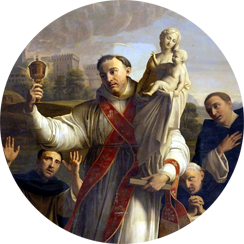
17 August
St. Hyacinth (1185-1257)
Dominican Missionary
Feast Day: August 17
Born: 1185 at Lanka Castle, Kamin, Silesia, Poland
Died: 15 August 1257 at Krakow, Poland
Canonized: 17 April 1594 by Pope Clement VIII
Patron of: Poland
According to the 1962 Missal of St. John XXIII the Extraordinary Form of the Roman Rite, today is the feast of St. Hyacinth, a canon of Krakow, who joined the Dominican Order in Rome during the lifetime of the founder, in about the year 1217. He returned to Krakow with the first band of Dominican missionaries. The newcomers spread over all the northern countries into Russia, the Balkans, Prussia and Lithuania. St. Hyacinth preached the crusade against the Prussians. He died on the feast of the Assumption, 1257.
From the Breviary we have this miracle. With three companions Hyacinth had arrived at the banks of the river Weichsel during their journey to Vischegrad, where they were expected to preach. But the waters had risen so high and had become so violent that no ferryman dared to cross. The saint took his mantle, spread it out before him, and with his companions rode across the raging waters. After saying his Office for the day, he died in 1257 with these words on his lips: “Into Your hands, Lord, I rest my spirit!”
Excerpted from The Church’s Year of Grace, Pius Parsch
COLLECT PRAYER
Almighty ever-living God, whom, taught by the Holy Spirit, we dare to call our Father, bring, we pray, to perfection in our hearts the spirit of adoption as your sons and daughters, that we may merit to enter into the inheritance which you have promised. Through our Lord Jesus Christ, your Son, who lives and reigns with you in the unity of the Holy Spirit, God, for ever and ever.
Things to Do:
- The Church’s night prayer, Compline, especially the closing invocations, serves as a fitting preparation for death. The two death scenes strike home with telling impact. Christ, hanging on the Cross, is uttering His last word: “Father, into Your hands I rest My spirit.” Meditatively we repeat the words and entrust our souls to the care of Christ in sleep, and if need be, in death. For Hyacinth it actually was his dying invocation. The second scene. The aged Simeon is singing: “Now You may dismiss Your servant in peace.” How appropriate as one’s last day approaches!
St. Hyacinth is called “the Polish St. Dominic,” which is to say that he was the founder of the Order in Poland the dynamo of holiness in the North that St. Dominic was in the South.
Hyacinth was born of the noble family of Odrowatz, in Polish Upper Silesia. He and Blessed Ceslaus, who was either a brother or a close relative, were carefully educated both in learning and in piety. They were greatly beloved by a priest uncle, Ivo, who sent them to the university and sponsored their education. The two young men were newly ordained priests and canons at the cathedral in Cracow when Ivo was appointed bishop of Cracow. When he went to Rome for his consecration, Ivo took his two young nephews with him.
In Rome, the Polish visitors heard much of the wonder working Spaniard, Dominic, and were present at the miracle he performed in restoring life to the nephew of Cardinal Napoleon. They were charmed with the ideals of the newly founded Order, and the new bishop begged St. Dominic to send friars to Poland. Dominic had no one to send, since none of the brethren spoke Polish, but his glance fell upon the two young priests in the bishop’s party. He gave them the habit, trained them himself, and sent them to evangelize the North.
Hyacinth’s life was henceforth an almost uninterrupted series of miracles. He walked a total of nearly twenty five thousand miles in his apostolic travels, preaching in all the countries of the North, from Denmark and Prussia to Greece, White Russia, Tartary, and Tibet. His progress among these hostile peoples, with their barbarous customs and unknown languages, through trackless forests, in the fierce cold of the North, can be explained only by a miracle.
Early in his mission career, Our Lady appeared to Hyacinth and promised him that she would never refuse him anything. Through the years of his arduous labor she kept her promise, and his ministry was rich with a harvest of souls. He performed many astounding miracles, including countless cures. On one occasion he gave sight to two boys who had been born without eyes. He raised several dead people to life. The best known incident in his life has to do with Our Lady, which is not surprising.
During one of the Tartar invasions the convent was attacked. Hyacinth was hurrying to remove the Blessed Sacrament to hide it, when he heard Our Lady tell him not to leave her statue behind to be desecrated. It was a large statue and Hyacinth did not know how he could carry it. “I will lighten the load,” said Our Lady. Carrying the Blessed Sacrament in one hand and the statue in the other, Hyacinth escaped from the burning convent and walked dry shod across the river. On every occasion of his life, Our Lady was to lighten the load for him, and, as a last favor, she appeared to tell him that he would die on the Feast of the Assumption.
Popular devotion to St. Hyacinth has survived time and many wars in the lands where he preached. He was the first outstanding ,missionary apostle whose life and work shed glory on the Order at its very beginning, establishing a pattern for all the years to come.
(Source : Dorcy, Marie Jean. St. Dominic’s Family. Tan Books and Publishers, 1983. www.dominicans.ca)